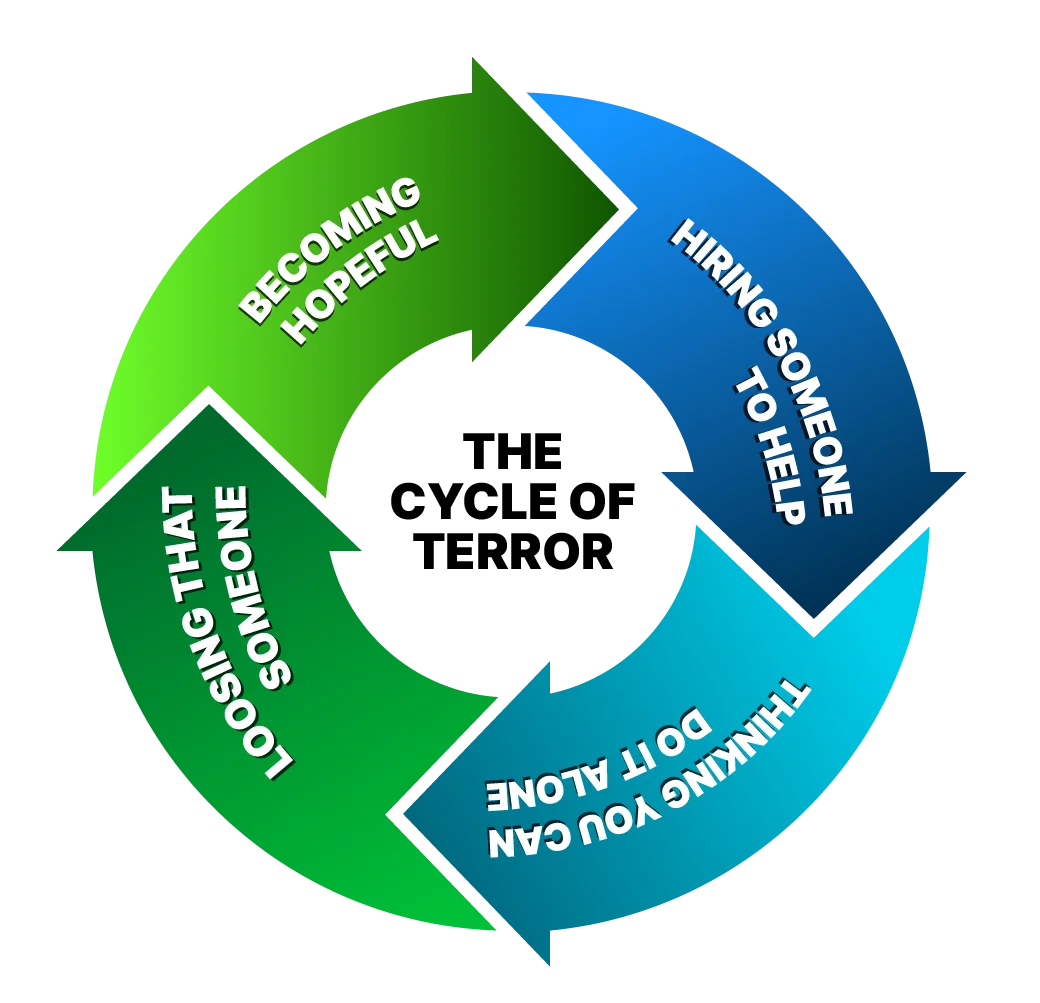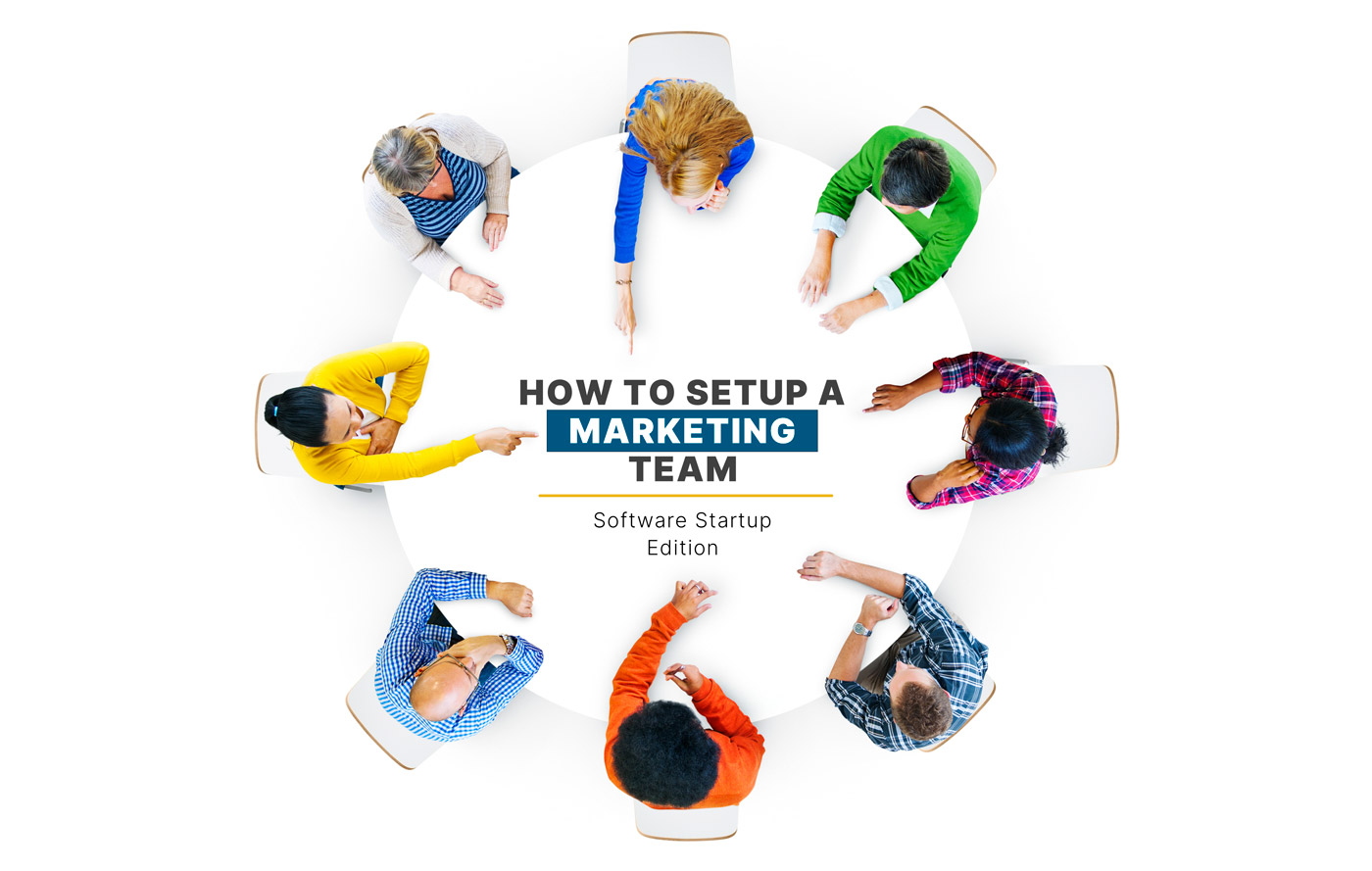Do not make the mistake most companies do!
If you are just starting a business and wondering how to setup a marketing team that will take your startup to a scaleup, you are prone to doing what most businesses do: seek a newbie marketer to handle social media and other small marketing tasks at the start of the business. Then, you are thinking, once you have gained a little traction, you will hire a more senior person to help you get further.
Well… That mostly does not work.
Why? Because the majority particularly good marketers are fed up with trying to clean up after someone who has done things messily for a while.
It is not difficult to build when something is new and fresh. But it is almost impossible to clean up 3, 4, 5 or more years’ worth of inconsistency, typos, bad designs, and bad business decisions.
Plus, by then most entrepreneurs are already too attached to their Frankenstein of a business and just like loving parents have grown blind to its obvious faults.
If your aim is to jump into the loop of becoming hopeful –> hiring someone to help –> losing that someone –> thinking you can do it all by yourself –> becoming hopeful, then by all means – make marketing executive or marketing assistant your first hire.
If you are in it for growth, however, keep reading.

How to setup a marketing team: Your First Hire
If you are running a software company you fall in one of two categories: you are either in a heavily saturated market or in one in which no one knows you exist. And sometimes you’re in both those categories.
Regardless of how valuable you think your product is, you will have to generate demand by getting your audience to understand the problem that you are solving. In some cases, you will even have to convince people that there is a problem in the first place.
Unless you are a marketing guru yourself and plan to run a market-oriented company (which I will talk about in another instance), then the combination of running a business AND running successful marketing operations will be impossible.
This is why your first hire needs to be a marketing generalist with considerable experience who is looking for their next career growth move in which they’ll have the opportunity to jump a few steps up the ladder.
What you’re looking for is someone who can craft a plan and execute it either using freelancers, internal resources, or their own ability.
But remember:
HIRE THEM FOR THEIR INTENTION AND VISION.
The most important aspect of hiring your first marketing person is to ensure that you’re on the same page for the next 5 or even 10 years of development of the company. You need to understand that this is probably going to be the person who will craft the public image of your message and will set the expectations of your customers. You cannot have different visions.
Here’s one important reminder: the vision that you share must be the vision that you’re willing to commit to. If you want to sell the business in 5 years and your aim is to grow it so it gets noticed by a tech giant, fine – share that. If your aim is “world peace”, also fine. Whatever you do, don’t push out a vision that sounds nice but that you’re not committed to with every fibre of your being.
How to setup a marketing team: Their profile
The first person to enter your marketing team should be a marketing generalist with 10+ years of experience.
You’re looking for someone who has done it all and is ready to move on to the next step, setup their team and achieve your goal for you.
In 2023, you’re looking for someone who has experience with:
- Designing and delivering marketing campaigns
- Inbound marketing
- Marketing automation
- Branding
- Content
- Project management
Here’s what you need to understand.
Hiring a marketer with who has previously led another company to success might be a great idea, but there are a few factors to consider:
- They will certainly cost you
- They mostly won’t be willing to roll up their sleeves and do the work themselves – they’ve done it already and proven their worth
- Your marketing budget will need to be quite significant to account for all the costs that will be generated
- They won’t be willing to sacrifice speed – people with proven track records have a status to maintain and this will be a factor that they will consider.
If all the above is acceptable and you can afford a person with a proven record of accomplishment, then fantastic! Do not hold back.
If, however, this sounds slightly overwhelming let me introduce you to an alternative.
Most marketing managers and senior marketing executives with 10+ years of experience are capable and often willing to progress to a higher level but find themselves either stuck in organisations that do not allow growth, or in ones where positions only become open after someone’s obituary. So, if you do receive an application from a person with experience in all the above areas and without a proven record of accomplishment, do not dismiss them.
What you need to ensure is that the person you hire is:
- Eager to prove themselves
- Understands how to build a team
- Is willing to train people on the things they know how to do
- Is able to project manage, write briefs, chase freelancers, and set expectations
- Looks at automation as an integral part of the process for the entire customer journey
- Is willing to work on the entire customer journey (you also have to be willing to let them)
If all of those aspects are in place and you like the person you’re speaking with, then they are likely a good hire.
How to setup a marketing team: KPIs for your first marketing hire
Don’t forget that your first marketing hire is going to be the only marketing person on your team for a while. Expecting them to start delivering inbound leads within the first couple of months is not just unrealistic, it’s practically downright stupid as you’ll set them up to only deal with promotion and little actual marketing.
You want your first marketing hire to do the following things:
- Clearly define the objective for the first 6 months: you need to confirm and commit to that objective. One person won’t be able to move the world, so be sure that it is achievable. Maybe this is going to be the creation of a website that provides a fantastic start of a customer journey, or to grow a specific social media channel, or something else. Whatever it is, decide it and stick to that for 6 months.
- Establish the strategy that will be used to achieve the objective: your marketing person will need to establish how to achieve the goal they’ve set for the first 6 months. Whether that will be by creating multiple videos for the website, expanding it, re-designing it, running surveys and publishing information, the strategy is the how. Once they’ve chosen a strategy, sign it off and don’t add bits and pieces every few days.
- Set up the metrics that they’ll track: you want your marketing person to identify what metrics they want to track and why. It’s also important that they state how they’ll adjust the strategy and tactics if any of the metrics proves inefficient.
- Setup the tactics and actions and define the budget: once the strategy and objectives are clear your marketing person will need to define the tactics they’ll use and the resources they need. Since it’s just one person they’ll probably need to use a freelancer
This is everything that you want from 1 marketing person within the first 6 months. Nothing more. Really, I mean it – nothing more. When those are set up, your job is to get out of their way and let them do their work.
How to setup a marketing team: How to onboard your first hire
Within a software organisation you want your first marketer to quickly and easily understand your product or service. The most important questions to answer are:
- What problem is your product solving
- What sparked the creation of your product
- What is the product’s roadmap
- What is the long-term goal for the product
- How do you currently receive feedback from your users
- How do you address feedback from your users
You also want to let your marketer person know:
- Who leads all technical development
- Who makes financial decisions
- Who are they going to be reporting to
- How regularly they’ll be reporting
Then, encourange your marketing person to spend some time with every team member so they can understand what everyone does and how everything works. I would urge you to allow this process to take approximately two weeks. Following these two weeks, allow your marketer to begin working on the plan.
Meanwhile, ensure that the person they’ll be reporting to and preferably the business owner (or one of the business owners) is available for questions and clarifications.
How to setup a marketing team: How to manage your first hire
If everything has gone right, your first marketing hire is not your subordinate, but instead – your best ally. So, theoretically, they should require no management – only support.
Ensure that this person has access to the resources they need (budgetary or others) and set up a biweekly catch-up where you check in with them to ensure that they have not stumbled upon an issue that doesn’t allow them to do their job. If you ever find out that this is the case, your only job is to remove the obstacle.
Your first marketing hire should be someone you feel comfortable enough to attend board meetings and to help you lead the company, prioritise tasks, and make decisions for the near and far future.
When to expect results from your first marketing hire?
Your first marketing person will produce visible results in 12 months or more. Do not be surprised if it takes longer for you to see growth. Marketing is a marathon, not a sprint so set your expectations properly and look forward to a gradual but promising growth.


